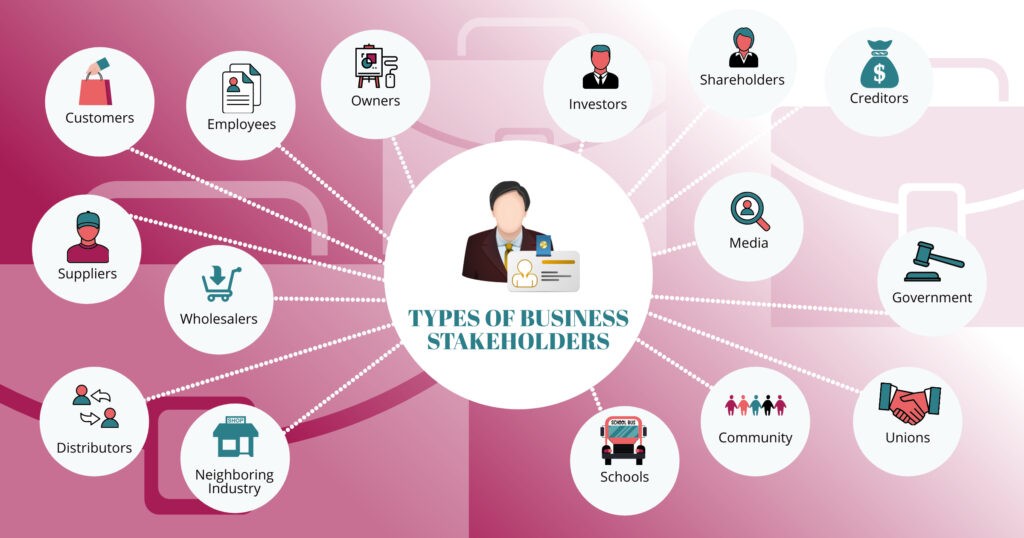The Importance of Stakeholders in Business

Not sure whether stakeholders matter for your business or not?
First, a basic definition…
In business, stakeholders are defined as the individuals or groups that are impacted by, have an influence on, or have an interest in your organization or project. Common types of stakeholders in business include customers, employees, shareholders, suppliers, wholesalers, distributors, neighboring businesses, local communities, and more.

A lot of the time, businesses place most of their focus on one or two stakeholder groups — customers and employees — and ignore their other stakeholders.
We strongly believe that in every business, stakeholders matter. And there’s plenty of evidence to back it up.
Here are 10 reasons why you need to track, manage, and engage with stakeholders in business…
10 Reasons Stakeholder Matter in Business

1. Increase Your Knowledge
Increasingly, the value of a business isn’t just what it owns, but what it knows. When you know and understand more, you can work smarter, make better decisions, come up with new (and profitable ideas), and increase your capabilities.
And in business, good stakeholder management and effective stakeholder engagement are significant contributors to what you know. For instance, you might consult with specific stakeholders who are local to your project or who have specialized knowledge in an area you want to move into — their insights could prove invaluable.
2. Tap Into Resources
In the same way that many stakeholders are willing to share information and knowledge with your business, others are able to share resources. For example, during periods of high demand, you might be able to share equipment with another local business. Or you might be able to share storage/office space with another stakeholder in order to keep both your costs down. Or you might share your staffing resources and collaborate with another stakeholder on a shared project or goal.
3. Reduce Your Risk
Building relationships with stakeholders and engaging with them can go a long way in reducing risk for your business. Not only due to the potential knowledge and resources you can tap into for your business, but because some stakeholders themselves may present additional risk that you need to manage. For instance, those with strong negative opinions, conflicts of interest, legal power, security power, and/or the ability to disrupt your supply chain. Careful stakeholder management and engagement can allow you to spot issues much sooner and take early action to reduce risk for your business.
4. Overcome Resistance to Change
In business, change is both inevitable and extremely challenging to navigate. Some of your stakeholders will welcome change, while others will likely resist it — likely because each change impacts each stakeholder differently. A stakeholder engagement perspective can be helpful at this time for a number of reasons, such as:
- Identifying who might be impacted by the change
- Identifying who might resist the change (and therefore, may need careful management)
- Encouraging stakeholders to provide input and perspectives
- Sharing relevant information to the right people at the right time
- Managing conflicting views and ideas
- Coming up with sustainable solutions that better meet the needs of all stakeholders
5. Get in Alignment
As a business leader, ‘getting in alignment’ is likely high on your priority list — whether that’s aligning different parts of your business, aligning your people with your organization’s goals/strategy, or something else. Regardless of how you need to create alignment, a stakeholder approach can be useful. It means you go through the process of identifying your business stakeholders and analyzing them to understand who they are, what they’re interested in, and what their goals might be. Through this process, you can take into consideration the different perspectives and goals of stakeholders when determining the direction of your organization, while strategically bridging any alignment gaps with the right message.
6. Support Corporate Governance
Corporate governance (that is, the internal processes, practices, and rules used to control and manage an organization) is an important consideration in any business, but especially in larger organizations. Many different stakeholders play an important role in corporate governance, including the company’s Board of Directors, CEO, management teams, employees, shareholders, suppliers, customers, local communities, and more. Engaging with these stakeholders in a way that’s relevant to their role can help to support corporate governance and ensure the organization operates smoothly and behaves with accountability, transparency, and integrity.
7. Build Strategic Relationships
For many in positions of leadership, building relationships with stakeholders to support the interests of the organization is a key responsibility. Many tools and methods used in stakeholder engagement can help identify strategic relationships and strengthen them. For instance, stakeholder mapping, stakeholder relationship mapping, and stakeholder network mapping can allow you to quickly pinpoint which relationships may prove more strategically relevant — and tracking those relationships in a tool like Simply Stakeholders can allow you to focus on the right person with the right message at the right time.
8. Do Good
Stakeholder management plays an important role in corporate social responsibility and sustainability, and applying best practices when engaging with stakeholders can help a business uphold its ethical obligations. Especially when you consider the needs of (and encourage input from) non-financial stakeholders that hold very little power or influence, but experience significant impacts due to your work. For example, local communities, primary producers, or suppliers.
9. Achieve Your Objectives
Stakeholders engagement in business can help you achieve all sorts of objectives and results. Maybe you want better relationships with suppliers, you need to manage stakeholder expectations, you need to increase social acceptance, or something else. Managing and engaging with your business stakeholders should play a key role in every project and strategy, supporting your underlying objectives.
10. Survive and Thrive in the Long Run
There’s plenty of evidence demonstrating that a short-term approach that focuses on shareholders is less profitable and sustainable than a long-term approach that considers the interests of various key stakeholders. If you want your business to survive and thrive in the long run, you’ll need to strategically manage and engage with each of your stakeholder groups.
Start Managing Your Business Stakeholders

We’ve made a pretty clear case for building stakeholder management or engagement into your business processes… but where do you actually start? We’ve got some resources to help:
- Create a stakeholder plan
- Identify your stakeholders
- Analyze your stakeholders
- Map your stakeholders
- Engage with your stakeholders
- Report on your engagement
- Evaluate your results and adjust your plan
- Make it easier with stakeholder software
Oh, and if you’re looking for a relationship management tool suitable for business stakeholders, we’ve got you covered. Check out Simply Stakeholders or reach out to our team to request a demo.






























